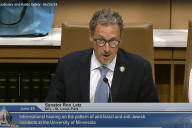You have /5 articles left.
Sign up for a free account or log in.
Australia's prime minister has described Australian National University's divestment of $16 million in energy stocks on environmental grounds as “stupid” and defended the government’s criticisms of the university’s decision.
“Of course they should be free to do what they want, but when they make stupid decisions we should be free to criticize them,” Prime Minister Tony Abbott said.
“Any entity which says that they’re simply not going to invest in energy companies is frankly depriving its members of the benefit of some very good investments, because Australia ought to be one of the world’s energy superpowers.”
Abbott had earlier in the week defended the coal industry and highlighted economic benefits flowing from the resources sector. “We ought to be the world’s affordable energy capital and that means in the months and years and decades to come, Australia’s energy companies will be a very, very good investment for people who are sensible enough to see where their opportunities are,” he said.
The government’s criticism of ANU has been rejected by former Liberal leaders Malcolm Fraser and John Hewson, as well as by companies that support ethical investments.
A left-wing think tank, the Australia Institute, took out a full-page advertisement in The Canberra Times Tuesday to accuse the government of crying “foul.”
The row followed ANU’s announcement that it would divest shares worth $16 million it held in resources companies as part of its $1.1 billion endowment fund. David Macri, chief investment officer of Australian Ethical Investments, which has nearly $1 billion under management, said he was “startled” by the government’s attacks on ANU.
Hewson said he thought the reaction of Abbott and some of his ministers was “bizarre.”
The blacklisted companies have disagreed with the assessment, pointing to various awards they have won, environmental processes they have used, and their inclusion in indices that screen for social and environmental factors.
Australian National's vice chancellor, Ian Young, defended the decision, saying: “We need to be able to put our hand on our heart when we talk to our students, and to our alumni, and to our researchers, and be able to say that we’re confident that the sort of companies that we’re investing in are consistent with the broad themes that drive this university.”
Universities Australia, a membership group, defended ANU’s right to decide its own investment policy but said it didn’t have a position on how universities invested holdings.
“It is part and parcel of a university being able to decide where it allocates its investment dollars,” said chief executive Belinda Robinson, who is a former chief executive of the Australian Petroleum Production and Exploration Association.








